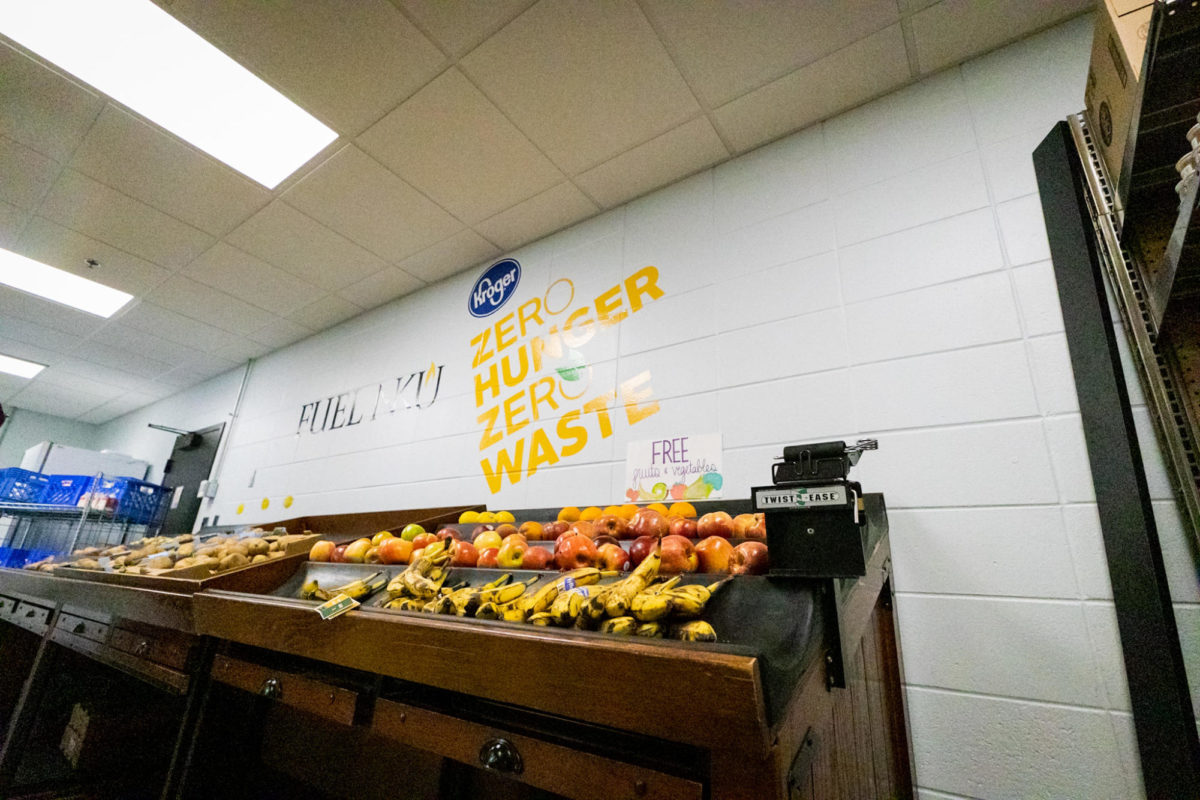With their frequent tabling, donation boxes around campus and food pantry that resembles a mini mart, FUEL NKU has a sustained presence at Northern Kentucky University, both for students who struggle to afford daily food and for those looking to pick up snacks for the week. A great amount of food comes into FUEL on a regular basis, but a good amount also comes out: under a partnership with on-campus Sustainability Operations and off-campus GoZERO Services, FUEL has composted over 3,000 pounds of food waste over the past year.
The initiative owes its start to Sustainability Operations Coordinator Tiffany Budd at Facilities Management, who was teaching the FUEL NKU staff the proper recycling methods for food items that they received last year. At one point the conversation turned to the amount of food waste that comes through FUEL—not because of mishandling on the office’s part, Budd said, but because they often receive items that are already approaching end of shelf life.
Most of FUEL’s food stock draws from donations by community partners, including the supermarket chain Kroger, which sponsors a grant that funds FUEL’s operations. Composting was then written into the grant and implemented in July 2022.
To start the composting process, FUEL repurposed a five-gallon lidded pickle container from a local Firehouse Subs, in which they dispose of food items that have passed the acceptable threshold of quality according to the office’s guidelines. These items might also be donated elsewhere, such as soup kitchens that have a use for them, said FUEL NKU Program Coordinator Nick Bliven.
The container is placed out of public view in the loading dock in the back of the Albright Health Center, the building that houses FUEL’s walk-in food pantry alongside the Campus Recreation Center. According to Budd, once every two weeks GoZERO Services, an Ohio-based nonprofit specializing in food waste collection, comes to pick up the compost and service the receptacle.
“They just give us a new bin, a new receptacle each time they come,” Budd said.
GoZERO then carries the food waste to their composting location, which lies about one to two hours from NKU’s campus. The nonprofit’s high-heat process allows them to accept materials that do not break down easily like bones, eggshells, pasta, even compostable egg cartons and wood, according to Budd. GoZERO sells or gives away the resulting compost—one of their facilities, Budd states, captures heat from the composting process itself to supplement energy for a nearby penitentiary.
While over 3,000 pounds of food waste composted over the course of one year sounds like an achievement, Bliven and Budd do not keep specific goalposts in mind for the initiative.
“My bigger picture is making sure we’re doing our best to alleviate waste that goes into landfills,” Bliven said, adding that he hopes to expand the process for the whole university some day.
If enacted, that expansion will be no easy feat. Budd describes two types of composting: the pre-consumer type that composts food scraps in kitchens, dining areas and anything wasted during food preparations; and the post-consumer type that deals with food that has been packaged, stored and purchased.
Pre-consumer composting is easier and more realistic for NKU’s current sustainability efforts since it excludes plastic packaging, containers and utensils, Budd said. On the other hand, post-consumer composting would pose a greater challenge, requiring the changing of cups and cutlery to be compostable, and often diners do not take the time to separate the plastic materials from food waste.
Still, a conversation is being had across campus regarding the potential for composting, Budd said. Furthermore, the recycling program at NKU is not limited to food waste. Budd and Sustainability Operations have partnered with the Cincinnati Recycling and Reuse Hub to tackle non-standard recyclables at NKU: glasses and contact lenses, pens and markers, empty toothpaste tubes, gift cards and parking passes.
The office’s current focus is a new sustainability strategy, though administrative and executive changes at the university have affected the pace of the process. “We’re waiting for the waters to settle a bit before we push things out,” Budd said.
As for FUEL NKU, which falls under the umbrella of University Connect and Persist (UCAP), “we’re really focusing on how we can better support students outside of their food needs,” Bliven said, explaining that students might need resources other than food or simply need guidance and support throughout their college journey.
“I’ve noticed a lot of excellent partnerships throughout the university and the community in order to provide food and serve students,” said UCAP and FUEL NKU Director Peg Adams. “I’m proud to be a part of this and I’m learning so much.”


